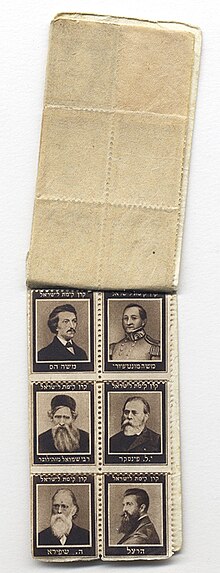Zvi Hermann Schapira (Hebrew: צבי הרמן שפירא; 1840–1898), or Hermann Hirsch Schapira, was a Lithuanian rabbi,[1] mathematician at the University of Heidelberg, and Zionist. He was the first to suggest founding a Jewish National Fund for the purchase of land in Palestine.


Biography
editZvi Hermann Schapira was born in a small Lithuanian town, Erswilken, not far from the larger town of Tauragė,[2] part of the Russian Empire, but also close to the Prussian border.[3] After studying for the rabbinate, Schapira was first appointed rabbi at age twenty-four, but then decided to dedicate his life to the secular sciences.[2] He first moved to Odessa, and in 1868 to Berlin, where he enrolled for three years at the Gewerbeakademie [de].[2] Schapira returned to Odessa, where he worked as a merchant for the next five years.[2]
In 1878 he switched back to scientific studies, spending the next four years in the German university town of Heidelberg where he especially concentrated on mathematics and physics.[2] In 1880, he applied for a PhD examination, with mathematics as a main subject and mechanics and Hebrew Language and Literature as secondary subjects.[3] That same year, with Lazarus Fuchs as thesis advisor, he earned his doctorate with the dissertation Lineare homogene Cofunktionen, "Linear homogeneous cofunctions".[3] In 1883 he established himself as Privatdozent in mathematics at the University of Heidelberg, becoming assistant professor in 1887.[3] Schapira published his mathematical work in a number of specialised journals.[2]
Throughout his life, Schapira remained a student of Hebrew literature, contributing an edition of the Mishnat ha-Middot (1880) based on a Munich manuscript.[2] He also wrote for the Hebrew periodicals Ha-Meliẓ, Ha-Ẓefirah, and Mi-Mizraḥ umi-Ma'arab.[2]
In the aftermath of the Russian pogroms of 1881, Schapira lent his support to the proto-Zionist Hibbat Zion movement.[4] In 1884, Schapira proposed the establishment of an organization for the acquisition of land in Eretz Yisrael and came up with the idea of the "Blue Box" as means of collecting money.[5] He presented proposal for the creation of a Jewish national fund at the First Zionist Congress of 1897,[4] where he supported the Basel program, proving to be an enthusiastic Zionist from the very beginning of the movement.[2] Although the Jewish National Fund (JNF) came into being only in 1901, at the Fifth Congress, after Shapira's death, he is still considered to be the "father" of the JNF.[6][4]
Also at the 1897 congress, Shapira brought up the idea of founding a Hebrew university in Jerusalem.[7]
During a Zionist lecture tour he contracted pneumonia in Cologne, and died there on 8 May 1898.[2]
References
editThis article incorporates text from a publication now in the public domain: Singer, Isidore; et al., eds. (1901–1906). "Schapira, Hermann". The Jewish Encyclopedia. New York: Funk & Wagnalls.
- ^ Myers, David N. "A New Scholalry Colony in Jerusalem: The Early History of Jewish Studies at the Hebrew University" (PDF). Judaism (The Origins of Modern Jewish Studies and the Founding of the Hebrew University, Issue No. 178 / Volume 45 / Number 2, Spring 1996). American Jewish Congress: 142–159 [146]. Retrieved 16 February 2021.
- ^ a b c d e f g h i j Jewish Encyclopedia
- ^ a b c d Kern, Günter (2011) [1992]. Dörflinger, Gabriele (ed.). Hermann Schapira (PDF). Heidelberger Texte zur Mathematikgeschichte (in German). Heidelberg: Universitätsbibliothek Heidelberg. pp. 40–42. Retrieved 16 February 2021.
{{cite book}}:|work=ignored (help) - ^ a b c Edelheit, Hershel, History Of Zionism: A Handbook And Dictionary
- ^ The Blue Box: Jewish National Fund
- ^ Glass, Joseph B. (2018). From New Zion to Old Zion: American Jewish Immigration and Settlement in Palestine, 1917-1939. American Holy Land Series (reprint ed.). Wayne State University Press. ISBN 9780814344224. Retrieved 16 February 2021.
- ^ Hebrew University Opens, Center for Israel Education, accessed 15 February 2021
Further reading
editSources mentioned in the Jewish Encyclopedia article:
- Kohut, Adolph, Berühmte Israelitische Männer und Frauen, vi. 249-250
- Allgemeine Zeitung des Judentums, May 13, 1898
- Aḥiasaf, 1898, pp. 296–301
- Ha-Meliẓ, 1898, No. 95; 1899, Nos. 62, 68, 76, 77